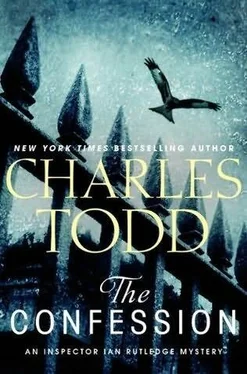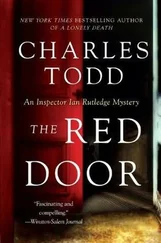Charles Todd - The Confession
Здесь есть возможность читать онлайн «Charles Todd - The Confession» весь текст электронной книги совершенно бесплатно (целиком полную версию без сокращений). В некоторых случаях можно слушать аудио, скачать через торрент в формате fb2 и присутствует краткое содержание. Жанр: Полицейский детектив, на английском языке. Описание произведения, (предисловие) а так же отзывы посетителей доступны на портале библиотеки ЛибКат.
- Название:The Confession
- Автор:
- Жанр:
- Год:неизвестен
- ISBN:нет данных
- Рейтинг книги:5 / 5. Голосов: 1
-
Избранное:Добавить в избранное
- Отзывы:
-
Ваша оценка:
- 100
- 1
- 2
- 3
- 4
- 5
The Confession: краткое содержание, описание и аннотация
Предлагаем к чтению аннотацию, описание, краткое содержание или предисловие (зависит от того, что написал сам автор книги «The Confession»). Если вы не нашли необходимую информацию о книге — напишите в комментариях, мы постараемся отыскать её.
The Confession — читать онлайн бесплатно полную книгу (весь текст) целиком
Ниже представлен текст книги, разбитый по страницам. Система сохранения места последней прочитанной страницы, позволяет с удобством читать онлайн бесплатно книгу «The Confession», без необходимости каждый раз заново искать на чём Вы остановились. Поставьте закладку, и сможете в любой момент перейти на страницу, на которой закончили чтение.
Интервал:
Закладка:
Rutledge said, “I shall have to go to Thetford. But this isn’t a good time to ask Mrs. Barber where to find the house.”
“If I ever knew, I’ve forgot,” Nelson said, looking away.
They watched a heron lift off from the far side of the river and fly toward the distant mouth in that strangely elegant slow motion that marked their flight. Then the two men turned back toward the High.
“We never really knew Ben, if you take my meaning,” Nelson said after a moment. “He wasn’t like the rest of them. Eager to go to sea as soon as they could, or if they weren’t fishermen, to work the farm or mind the greengrocer’s shop. Furnham is set in its ways, you can see that for yourself. It looks to the sea, not to London. At first I didn’t understand, I thought they were all benighted. But I came to like the way things were done here. I didn’t want to leave.”
“Where did you live before?”
“In the Fen country. Not all that different in some ways from the marshes, as far as the land goes. A hundred years different in our way of seeing things.”
“But you couldn’t be the village constable and still shut your eyes to the smuggling.” At the expression of alarm on Nelson’s face, Rutledge said, “I saw the brandy bottle on your floor. It’s only my business if it has anything to do with the murder of Ben Willet.”
Nelson took a deep breath. There was a suggestion of resentment in his voice, overlaid with guilt. “If I’d told London what I suspected about the smuggling, I’d have had to leave Furnham. I knew that from the start. I made my choice.”
“It hasn’t been much of a life for you.”
The constable shrugged. “I was never an ambitious man.”
On the surface that was evident. And yet-what had he left behind, what had he turned his back on, that made spending his days and nights in a drunken stupor a better way of life?
They had reached The Dragonfly. Nelson pointed to the sign above the door, creaking on its hinges as the wind picked up. “That was the name of a ship. Did you know?”
“A smugglers’ craft?”
“No.” He shrugged again. “Not that it matters. What do you want of me, sir? Do you think the murderer is here, in Furnham? Am I to help you search him out?”
“I don’t know. I’d hoped you could tell me something about Willet and the Russells that would explain what connected the two men. All I’ve found is the disappearance of Russell’s mother.”
“In your place, I’d look in London. Ben Willet was away from Furnham long enough to have made enemies somewhere. There’s no one here who wanted him dead.”
But Hamish didn’t believe him, stirring restlessly and warning Rutledge.
“Perhaps I will.” He saw the relief in Nelson’s eyes and added, “You’ll send for me, if you learn anything to the contrary?”
Nelson promised, but Rutledge knew even as the words were spoken that the constable had no intention of keeping that promise and contacting him. Whatever he might learn. His duty was to Furnham, not to Scotland Yard.
Rutledge nodded and walked on into Reception. Head down, Nelson turned toward his home. Rutledge wondered what repercussions there might be for the constable now that he’d been seen talking to Scotland Yard. Even if he had told London nothing of importance.
The clerk was behind the desk, sorting through papers, and he looked up as Rutledge approached.
“Where’s the churchyard?” he asked, and the man stared at him as if he’d asked directions to the moon. There must, he thought, be a shorter way to get there than driving out of the village.
“The churchyard?”
“Presumably you have one? I understand Ned Willet will be buried there tomorrow.”
“Ah.” Reassured, the clerk said, “If you go down past his daughter’s house, there’s a road beyond. Well, not much of a road at that. More of a track that has seen better days. Follow it west, and you’ll find the churchyard.”
Rutledge thanked him and went out to his motorcar.
Hamish said, “What really kept yon constable in Furnham?”
I’d like to know, Rutledge silently replied as he turned the crank. It’s as if everyone in this village has a guilty conscience.
He followed directions, driving down the lane past the Barber house, quiet now, the door shut, and saw that just beyond there was indeed a road half hidden by the tall summer grasses.
When he reached it, he realized that to the east it must run past the farm where he’d interviewed Nancy Brothers, eventually circling back into Furnham. From this vantage point, he had a very clear view of the farm beyond hers, where the land was still high enough for good drainage. And the other end of this track must lead to the Rectory before debouching on the London Road, just as Morrison had told him. A loop, as it were, marching in parallel with the High Street.
As he turned toward the west, ahead across the marsh he could just glimpse the tops of yews. And where there were yews there was usually a churchyard. In the far distance, he thought he saw the glint of sun on water. Another river? Or just one of those temporary pools that appeared after a heavy rain and soon vanished? Indeed, the track under his tires was soft from the storm of the other night.
When he reached the churchyard, the graves were, to his surprise, well kept, the grass cropped short, flowers blooming here and there where they had been planted at a headstone. He could also see, as he got out to walk among the graves, that the village had buried its dead here for centuries, for the older stones had settled crookedly, any inscription on them long since covered by lichen or flaked into dust.
At the back of the churchyard, marking the far boundary of graves, he could see a pair of low tumuli. They were long grass-covered mounds, and surely not old enough to be prehistoric.
Hamish said, “Plague victims.”
Rutledge thought he was right. It was often the practice to bury the dead quickly in lime-filled trenches. But he couldn’t remember having seen any as clearly defined as these.
Walking among the stones, glancing at dates here and there, he read the familiar names. There were any numbers of Willets and Barbers, Brotherses and Montgomerys, going back generations, and among them a score or more of other family surnames. Among the Willets, someone-was there a sexton here?-had dug Ned Willet’s grave. Next to his were two memorial stones to his sons lost in the war.
Behind a phalanx of tall yews stood a stone mausoleum. As he approached it, he could read the name incised above the grille that formed the doorway. RUSSELL.
He was more than a little surprised to find it here. He would have thought that the family would have preferred to bury its dead elsewhere. Ornate stone urns, draped in the carved folds of mourning crepe, were set to either side of the doorway. They were empty, and he realized that there was no one to care for them. Certainly not Cynthia Farraday. Did she ever come here? And where was Wyatt Russell?
He stared into the shadowy interior, trying to read the names on the marble squares that marked each interment. But it was too dark, and all he could decipher were the inscriptions on a pair of plaques nearest the grille.
The first was a memorial to Captain Malcolm Arthur George Russell, his dates, and the final inscription, DIED OF WOUNDS RECEIVED IN THE RELIEF OF MAFEKING.
Below it was the memorial to his wife: IN LOVING MEMORY OF E MILY ELIZABETH MARGARET TALBOT RUSSELL, and the dates of her birth and her disappearance.
This was the plaque that Morrison had spoken of, the one villagers had objected to because of the possibility that Mrs. Russell was a suicide.
He walked on, beyond the lilacs that encircled the mausoleum, as if setting it off in death from the village just as the circumstances of their material worth had set the occupants apart in life.
Читать дальшеИнтервал:
Закладка:
Похожие книги на «The Confession»
Представляем Вашему вниманию похожие книги на «The Confession» списком для выбора. Мы отобрали схожую по названию и смыслу литературу в надежде предоставить читателям больше вариантов отыскать новые, интересные, ещё непрочитанные произведения.
Обсуждение, отзывы о книге «The Confession» и просто собственные мнения читателей. Оставьте ваши комментарии, напишите, что Вы думаете о произведении, его смысле или главных героях. Укажите что конкретно понравилось, а что нет, и почему Вы так считаете.












